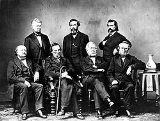
Impeachment of Andrew Johnson
Encyclopedia
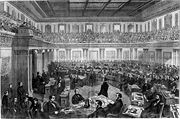
Andrew Johnson
Andrew Johnson was the 17th President of the United States . As Vice-President of the United States in 1865, he succeeded Abraham Lincoln following the latter's assassination. Johnson then presided over the initial and contentious Reconstruction era of the United States following the American...
, 17th President of the United States
President of the United States
The President of the United States of America is the head of state and head of government of the United States. The president leads the executive branch of the federal government and is the commander-in-chief of the United States Armed Forces....
, was one of the most dramatic events in the political life of the United States
United States
The United States of America is a federal constitutional republic comprising fifty states and a federal district...
during Reconstruction, and the first impeachment in history of a sitting United States president.
The Impeachment was the consummation of a lengthy political battle, between the moderate Johnson and the "Radical Republican
Radical Republican
The Radical Republicans were a loose faction of American politicians within the Republican Party from about 1854 until the end of Reconstruction in 1877...
" movement that dominated Congress
United States Congress
The United States Congress is the bicameral legislature of the federal government of the United States, consisting of the Senate and the House of Representatives. The Congress meets in the United States Capitol in Washington, D.C....
, for control of Reconstruction policies after the American Civil War
American Civil War
The American Civil War was a civil war fought in the United States of America. In response to the election of Abraham Lincoln as President of the United States, 11 southern slave states declared their secession from the United States and formed the Confederate States of America ; the other 25...
.
Johnson was impeached
Impeachment in the United States
Impeachment in the United States is an expressed power of the legislature that allows for formal charges against a civil officer of government for crimes committed in office...
on February 24, 1868 in the U.S. House of Representatives
United States House of Representatives
The United States House of Representatives is one of the two Houses of the United States Congress, the bicameral legislature which also includes the Senate.The composition and powers of the House are established in Article One of the Constitution...
on eleven articles of impeachment detailing his "high crimes and misdemeanors", in accordance with Article Two of the United States Constitution
Article Two of the United States Constitution
Article Two of the United States Constitution creates the executive branch of the government, consisting of the President and other executive officers.-Clause 1: Executive power:...
. The House's primary charge against Johnson was with violation of the Tenure of Office Act, passed by Congress the previous year. Specifically, he had removed Edwin M. Stanton
Edwin M. Stanton
Edwin McMasters Stanton was an American lawyer and politician who served as Secretary of War under the Lincoln Administration during the American Civil War from 1862–1865...
, the Secretary of War
United States Secretary of War
The Secretary of War was a member of the United States President's Cabinet, beginning with George Washington's administration. A similar position, called either "Secretary at War" or "Secretary of War," was appointed to serve the Congress of the Confederation under the Articles of Confederation...
(whom the Tenure of Office Act was largely designed to protect), from office and replaced him with Ulysses S. Grant.
The House agreed to the articles of impeachment on March 2, 1868. The trial began three days later in the Senate
United States Senate
The United States Senate is the upper house of the bicameral legislature of the United States, and together with the United States House of Representatives comprises the United States Congress. The composition and powers of the Senate are established in Article One of the U.S. Constitution. Each...
, with Supreme Court Chief Justice
Chief Justice of the United States
The Chief Justice of the United States is the head of the United States federal court system and the chief judge of the Supreme Court of the United States. The Chief Justice is one of nine Supreme Court justices; the other eight are the Associate Justices of the Supreme Court of the United States...
Salmon P. Chase
Salmon P. Chase
Salmon Portland Chase was an American politician and jurist who served as U.S. Senator from Ohio and the 23rd Governor of Ohio; as U.S. Treasury Secretary under President Abraham Lincoln; and as the sixth Chief Justice of the United States Supreme Court.Chase was one of the most prominent members...
presiding. Trial concluded on May 26 with Johnson's acquittal, the final count falling one vote shy of the required tally for conviction.
The impeachment and subsequent trial gained a historical reputation as an act of political expedience, rather than necessity, based on Johnson's defiance of an unconstitutional piece of legislation and with little regard for the will of the public (which, despite the unpopularity of Johnson, opposed the impeachment). Until the impeachment of Bill Clinton
Impeachment of Bill Clinton
Bill Clinton, President of the United States, was impeached by the House of Representatives on charges of perjury and obstruction of justice on December 19, 1998, but acquitted by the Senate on February 12, 1999. Two other impeachment articles, a second perjury charge and a charge of abuse of...
131 years later, it was the only presidential impeachment in the history of the United States.
Background
Tensions between the executive and legislative branches had been high since shortly after Johnson's ascension to the White HouseWhite House
The White House is the official residence and principal workplace of the president of the United States. Located at 1600 Pennsylvania Avenue NW in Washington, D.C., the house was designed by Irish-born James Hoban, and built between 1792 and 1800 of white-painted Aquia sandstone in the Neoclassical...
upon the assassination of Abraham Lincoln
Abraham Lincoln
Abraham Lincoln was the 16th President of the United States, serving from March 1861 until his assassination in April 1865. He successfully led his country through a great constitutional, military and moral crisis – the American Civil War – preserving the Union, while ending slavery, and...
. Though a Southerner himself, Johnson had been a fierce and unrelenting critic of the southern secession that had sparked the Civil War in the first place. Radical Republicans were convinced that as President, Johnson would enact their hardline Reconstruction policies of protection for newly freed slaves and punishment for former slave owners and government and military officials. (Lincoln had favored a much more moderate and lenient plan for Reconstruction, which the Radicals vehemently opposed but lacked the political capital to stop).
Instead, six weeks after taking office, Johnson had offered proclamations of general amnesty for most former confederates, and his initially stricter plans for high-ranking government and military officers quickly dissolved. Johnson also vetoed legislation that extended civil rights and financial support for the former slaves. Congress was able to override only a few of his vetoes, setting the stage for a confrontation between Congress and the president.
In August and September of 1866, Johnson destroyed his own political support on a speaking tour of northern states that became known as the Swing Around the Circle
Swing Around the Circle
Swing Around the Circle refers to a disastrous speaking campaign undertaken by U.S. President Andrew Johnson August 27 - September 15, 1866, in which he tried to gain support for his mild Reconstruction policies and for his preferred candidates in the forthcoming midterm Congressional election...
. Meant to establish a coalition of voters who would support Johnson in the upcoming midterm congressional elections, the tour instead destroyed his reputation when reports of his undisciplined, vitriolic speeches and ill-advised confrontations with hecklers swept the nation. Contrary to Johnson's hopes, the midterm elections led to veto-proof Republican majorities in Congress. The Radicals were not only able to pass civil rights legislation, but wrested control of Reconstruction from the president and took the reins themselves by carving the old Confederacy into five military districts.
Tenure of Office Act
Congress' control of the military Reconstruction policy was mitigated by Johnson's command of the military as President; however, Johnson had inherited as Secretary of War Lincoln's appointee Edwin M. StantonEdwin M. Stanton
Edwin McMasters Stanton was an American lawyer and politician who served as Secretary of War under the Lincoln Administration during the American Civil War from 1862–1865...
, a staunch Radical Republican, who as long as he remained in office would comply with congressional Reconstruction policies. To ensure Stanton was not replaced, Congress passed the Tenure of Office Act in 1867 over Johnson's veto. The act restricted the president from relieving any member of his cabinet without express concurrence of the Senate. However, the act was written specifically with Stanton in mind.
Aside from their ideological difference, Johnson wanted to replace Stanton for numerous reasons. Stanton had taken control of the country after Lincoln's assassination and controlled departments other than the War Department
United States Department of War
The United States Department of War, also called the War Department , was the United States Cabinet department originally responsible for the operation and maintenance of the United States Army...
. Most notably, Stanton was involved in running the State Department
United States Department of State
The United States Department of State , is the United States federal executive department responsible for international relations of the United States, equivalent to the foreign ministries of other countries...
, which was officially headed by Secretary of State
United States Secretary of State
The United States Secretary of State is the head of the United States Department of State, concerned with foreign affairs. The Secretary is a member of the Cabinet and the highest-ranking cabinet secretary both in line of succession and order of precedence...
William H. Seward
William H. Seward
William Henry Seward, Sr. was the 12th Governor of New York, United States Senator and the United States Secretary of State under Abraham Lincoln and Andrew Johnson...
. Stanton was also accused of using the Secret Service
United States Secret Service
The United States Secret Service is a United States federal law enforcement agency that is part of the United States Department of Homeland Security. The sworn members are divided among the Special Agents and the Uniformed Division. Until March 1, 2003, the Service was part of the United States...
to spy on Johnson and other members of the cabinet.
Because the Tenure of Office Act permitted the president to suspend such officials when Congress was out of session, when Johnson failed to obtain Stanton's resignation he instead suspended Stanton on August 5, 1867, which gave him the opportunity to appoint General Ulysses S. Grant
Ulysses S. Grant
Ulysses S. Grant was the 18th President of the United States as well as military commander during the Civil War and post-war Reconstruction periods. Under Grant's command, the Union Army defeated the Confederate military and ended the Confederate States of America...
then serving as Commanding General of the Army
Commanding General of the United States Army
Prior to the institution of the Chief of Staff of the United States Army in 1903, there was generally a single senior-most officer in the army. From 1783, he was known simply as the Senior Officer of the United States Army, but in 1821, the title was changed to Commanding General of the United...
, Secretary of War ad interim
Ad interim
The Latin phrase ad interim literally means "in the time between" denotes the meaning of "in the meantime", "for an intervening time" or "temporarily" in the English language...
.
On January 7, 1868, the Senate passed a resolution of non-concurrence with Stanton's dismissal. Believing the Tenure of Office Act unconstitutional, Johnson ignored their reinstatement of Stanton until, on January 28, Grant (who did not enjoy politics and resented Johnson's exploitation of his celebrity) sent the president his notice of resignation, effectively returning the office to Stanton. Johnson's second choice for the position was General William Tecumseh Sherman
William Tecumseh Sherman
William Tecumseh Sherman was an American soldier, businessman, educator and author. He served as a General in the Union Army during the American Civil War , for which he received recognition for his outstanding command of military strategy as well as criticism for the harshness of the "scorched...
, an enemy of Stanton's, who turned the President down saying he hated politics. Johnson then offered the post to Lorenzo Thomas, who first turned it down, saying that he would like to stay in office as Adjutant General until his retirement. Johnson prevailed, however, and on February 21, 1868 the President appointed Lorenzo Thomas Secretary of War ad interim
Ad interim
The Latin phrase ad interim literally means "in the time between" denotes the meaning of "in the meantime", "for an intervening time" or "temporarily" in the English language...
and ordered the removal of Stanton from office. Thomas personally delivered the President’s dismissal notice to Stanton, but the Secretary refused to accept its legitimacy or to vacate the premises. Instead, Stanton had barricaded himself in his office and ordered Thomas arrested for violating the Tenure of Office Act.
Thomas asked if he could be brought to the White House to let the President know that he had been placed under arrest. When Stanton realized, however, that the arrest would allow the courts to review the law, he had the charges dropped. Stanton then claimed that Johnson had broken the recently instituted Tenure of Office Act by removing a cabinet member without Senate approval, though some say that the Act was simply intended to maintain Republican control of the house.
On February 22, 1868, Representative William D. Kelley
William D. Kelley
William D. Kelley was a Republican member of the U.S. House of Representatives from Pennsylvania. Kelley was a lifelong advocate of civil rights, social reform, and labor protection.-Early life:...
of Philadelphia gave a speech, saying, "Sir, the bloody and untilled fields of the ten unreconstructed States, the unsheeted ghosts of the two thousand murdered negroes in Texas, cry, if the dead ever evoke vengeance, for the punishment of Andrew Johnson"
Impeachment
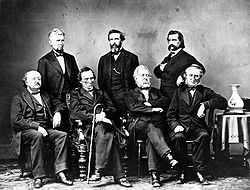
Thaddeus Stevens
Thaddeus Stevens , of Pennsylvania, was a Republican leader and one of the most powerful members of the United States House of Representatives...
and John A. Bingham
John Bingham
John Armor Bingham was a Republican congressman from Ohio, America, judge advocate in the trial of the Abraham Lincoln assassination and a prosecutor in the impeachment trials of Andrew Johnson...
were immediately dispatched to inform the Senate that the House had officially voted for impeachment.
One week later, the House adopted eleven articles of impeachment against the president. The articles charged Johnson with:
- Dismissing Stanton from office after the Senate had voted not to concur with his dismissal and had ordered him reinstated.
- Appointing Thomas Secretary of War ad interim despite the lack of vacancy in the office, since the dismissal of Stanton had been invalid.
- Appointing Thomas without the required advice and consentAdvice and consentAdvice and consent is an English phrase frequently used in enacting formulae of bills and in other legal or constitutional contexts, describing a situation in which the executive branch of a government enacts something previously approved of by the legislative branch.-General:The expression is...
of the Senate. - Conspiring, with Thomas and "other persons to the House of Representatives unknown," to unlawfully prevent Stanton from continuing in office.
- Conspiring to unlawfully curtail faithful execution of the Tenure of Office Act.
- Conspiring to "seize, take, and possess the property of the United States in the Department of War."
- Conspiring to "seize, take, and possess the property of the United States in the Department of War" with specific intent to violate the Tenure of Office Act.
- Issuing to Thomas the authority of the office of Secretary of War with unlawful intent to "control the disbursements of the moneys appropriated for the military service and for the Department of War."
- Issuing to Major General William H. EmoryWilliam H. EmoryWilliam Hemsley Emory was an United States Army officer and surveyor of Texas.-Early life and career:...
orders with unlawful intent to violate the Tenure of Office Act. - Making three speeches with intent to show disrespect for the Congress among the citizens of the United States.
The eleventh article was a summation of the first ten.
Trial
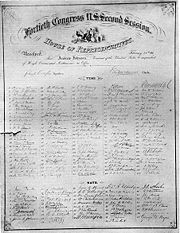
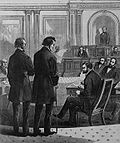
United States Senate
The United States Senate is the upper house of the bicameral legislature of the United States, and together with the United States House of Representatives comprises the United States Congress. The composition and powers of the Senate are established in Article One of the U.S. Constitution. Each...
, headed by Chief Justice
Chief Justice of the United States
The Chief Justice of the United States is the head of the United States federal court system and the chief judge of the Supreme Court of the United States. The Chief Justice is one of nine Supreme Court justices; the other eight are the Associate Justices of the Supreme Court of the United States...
Salmon P. Chase
Salmon P. Chase
Salmon Portland Chase was an American politician and jurist who served as U.S. Senator from Ohio and the 23rd Governor of Ohio; as U.S. Treasury Secretary under President Abraham Lincoln; and as the sixth Chief Justice of the United States Supreme Court.Chase was one of the most prominent members...
, and committees were organized to represent the prosecution and defense. The impeachment committee was made up of Thaddeus Stevens
Thaddeus Stevens
Thaddeus Stevens , of Pennsylvania, was a Republican leader and one of the most powerful members of the United States House of Representatives...
, Benjamin F. Butler
Benjamin Franklin Butler (politician)
Benjamin Franklin Butler was an American lawyer and politician who represented Massachusetts in the United States House of Representatives and later served as the 33rd Governor of Massachusetts....
, John A. Bingham
John Bingham
John Armor Bingham was a Republican congressman from Ohio, America, judge advocate in the trial of the Abraham Lincoln assassination and a prosecutor in the impeachment trials of Andrew Johnson...
, John A. Logan
John A. Logan
John Alexander Logan was an American soldier and political leader. He served in the Mexican-American War and was a general in the Union Army in the American Civil War. He served the state of Illinois as a state senator, congressman and senator and was an unsuccessful candidate for Vice President...
, George S. Boutwell
George S. Boutwell
George Sewall Boutwell was an American statesman who served as Secretary of the Treasury under President Ulysses S...
, Thomas Williams
Thomas Williams (Pennsylvania)
Thomas Williams was a United States representative from Pennsylvania.Williams was born in Greensburg, Pennsylvania. He attended the common schools and graduated from Dickinson College in Carlisle, Pennsylvania in 1825. In 1828, he was admitted to the Pennsylvania bar and began practicing in...
and James F. Wilson
James Falconer Wilson
James Falconer "Jefferson Jim" Wilson was a lawyer, Republican U.S. Congressman from Iowa's 1st congressional district during the American Civil War, and a two-term U.S. Senator from Iowa...
. Johnson's defense team was made up of Alexander Morgan, William M. Evarts
William M. Evarts
William Maxwell Evarts was an American lawyer and statesman who served as U.S. Secretary of State, U.S. Attorney General and U.S. Senator from New York...
, Benjamin R. Curtis
Benjamin Robbins Curtis
Benjamin Robbins Curtis was an American attorney and United States Supreme Court Justice.Curtis was the first and only Whig justice of the Supreme Court. He was also the first Supreme Court justice to have a formal legal degree and is the only justice to have resigned from the court over a matter...
, Thomas A. R. Nelson
Thomas Amos Rogers Nelson
Thomas Amos Rogers Nelson was an American attorney, politician, and judge, active primarily in East Tennessee during the mid-19th century. He represented Tennessee's 1st Congressional District in the 36th U.S. Congress , where he gained a reputation as a staunch pro-Union southerner...
and Jeremiah S. Black
Jeremiah S. Black
Jeremiah Sullivan Black was an American statesman and lawyer. He was the son of Representative Henry Black, and the father of writer and Lieutenant Governor of Pennsylvania Chauncey Forward Black....
(who later resigned). The trial began on March 13, 1868.

On the first day, Johnson's defense committee asked for forty days to collect evidence and witnesses since the prosecution had had a longer amount of time to do so, but only ten days were granted. The proceedings began on March 23. Senator Garrett Davis
Garrett Davis
Garrett Davis was a U.S. Senator and Representative from Kentucky.Born in Mount Sterling, Kentucky, Garrett Davis was the brother of Amos Davis. After completing preparatory studies, Davis was employed in the office of the county clerk of Montgomery County, Kentucky, and afterward of Bourbon...
argued that because not all states were represented in the Senate the trial could not be held and that it should therefore be adjourned. The motion was voted down. After the charges against the President were made, Henry Stanberry asked for another thirty days to assemble evidence and summon witnesses, saying that in the ten days previously granted there had only been enough time to prepare the President's reply. John A. Logan argued that the trial should begin immediately and that Stanberry was only trying to stall for time. The request was turned down in a vote 41 to 12. However, the Senate voted the next day to give the defense six more days to prepare evidence, which was accepted.
The trial commenced again on March 30. Benjamin F. Butler opened for the prosecution with a three hour speech reviewing historical impeachment trials, going back to King John
John of England
John , also known as John Lackland , was King of England from 6 April 1199 until his death...
of England. For days Butler spoke out against Johnson's violations of the Tenure of Office Act and further charged that the President had issued orders directly to Army officers without sending them through General Grant. The defense argued that Johnson had not violated the Tenure of Office Act because President Abraham Lincoln
Abraham Lincoln
Abraham Lincoln was the 16th President of the United States, serving from March 1861 until his assassination in April 1865. He successfully led his country through a great constitutional, military and moral crisis – the American Civil War – preserving the Union, while ending slavery, and...
did not reappoint Stanton Secretary of War at the beginning of his second term in 1865 and that he was therefore a leftover appointment from the 1860 cabinet, which removed his protection by the Tenure of Office Act. The prosecution called several witnesses in the course of the proceedings until April 9, when they rested their case.
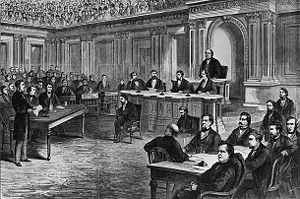
Acquittal
On all three occasions, thirty-five Senators voted "guilty" and nineteen "non-guilty". As the Constitution requires a two-thirds majority for conviction in impeachment trials, Johnson was thus acquitted. Just one changed vote to guilty would have sufficed for a "guilty" verdict.Seven Republican senators were concerned that the proceedings had been manipulated to give a one-sided presentation of the evidence. Senators William Pitt Fessenden (Maine), Joseph S. Fowler
Joseph S. Fowler
Joseph Smith Fowler was a United States Senator from Tennessee from 1866 to 1871.-Biography:Fowler was born in Steubenville, Ohio. He graduated from Grove Academy in that city and subsequently from Franklin College in New Athens, Ohio in 1843. He taught school in Shelby County, Kentucky in 1844...
(Tennessee), James W. Grimes
James W. Grimes
James Wilson Grimes was an American politician, serving as the third Governor of Iowa and a United States Senator from Iowa.-Biography:...
(Iowa), John B. Henderson
John B. Henderson
John Brooks Henderson was a United States Senator from Missouri and a co-author of the Thirteenth Amendment to the United States Constitution....
(Missouri), Lyman Trumbull
Lyman Trumbull
Lyman Trumbull was a United States Senator from Illinois during the American Civil War, and co-author of the Thirteenth Amendment to the United States Constitution.-Education and early career:...
(Illinois), Peter G. Van Winkle
Peter G. Van Winkle
Peter Godwin Van Winkle was a United States Senator from West Virginia.Born in New York City, he completed preparatory studies, studied law, and was admitted to the bar, commencing practice in Parkersburg, Virginia in 1835...
(West Virginia), and Edmund G. Ross
Edmund G. Ross
Edmund Gibson Ross was a politician who represented the state of Kansas after the American Civil War and was later governor of the New Mexico Territory. His vote against convicting of President Andrew Johnson of "high crimes and misdemeanors" allowed Johnson to stay in office by the margin of one...
(Kansas), who provided the decisive vote, defied their party by voting against conviction. After the trial, Ben Butler conducted hearings on the widespread reports that Republican senators had been bribed to vote for Johnson's acquittal. In Butler's hearings, and in subsequent inquiries, there was increasing evidence that some acquittal votes were acquired by promises of patronage jobs and cash cards.
Later Review of Johnson's Impeachment
In 1887, the Tenure of Office Act was repealed by Congress, and subsequent rulings by the United States Supreme CourtSupreme Court of the United States
The Supreme Court of the United States is the highest court in the United States. It has ultimate appellate jurisdiction over all state and federal courts, and original jurisdiction over a small range of cases...
seemed to support Johnson's position that he was entitled to fire Stanton without Congressional approval. The Supreme Court's ruling on a similar piece of later legislation in the 1926 Myers v. United States
Myers v. United States
Myers v. United States, , was a United States Supreme Court decision ruling that the President has the exclusive power to remove executive branch officials, and does not need the approval of the Senate or any other legislative body....
affirmed the ability of the President to remove a Postmaster
Postmaster
A postmaster is the head of an individual post office. Postmistress is not used anymore in the United States, as the "master" component of the word refers to a person of authority and has no gender quality...
without Congressional approval, and stated in its majority opinion "that the Tenure of Office Act of 1867...was invalid".
Further reading
- Benedict, Michael Les. "A New Look at the Impeachment of Andrew Johnson," Political Science Quarterly, Sep 1973, Vol. 88 Issue 3, pp 349-367 in JSTOR
- Benedict, Michael Les. The impeachment and trial of Andrew Johnson (1973), 212pp; the standard scholarly history online edition
- DeWitt, David M. The impeachment and trial of Andrew Johnson (1903), old monograph online edition
- McKitrick, Eric L. Andrew Johnson and Reconstruction (1960) influential analysis
- Rable, George C. "Forces oOf Darkness, Forces of Light: The Impeachment of Andrew Johnson and the Paranoid Style," Southern Studies 1978, Vol. 17 Issue 2, pp 151-173
- Sefton, James E. "The Impeachment of Andrew Johnson: A Century of Writing," Civil War History, June 1968, Vol. 14 Issue 2, pp 120-147
- Stathis, Stephen W. "Impeachment and Trial of President Andrew Johnson: A View from the Iowa Congressional Delegation," Presidential Studies Quarterly Vol. 24, No. 1, (Winter, 1994), pp. 29-47 in JSTOR
- Stewart, David O. Impeached: The Trial of President Andrew Johnson and the Fight for Lincoln's Legacy (2009)
- Trefousse, Hans L. "The Acquittal of Andrew Johnson and the Decline of the Radicals," Civil War History, June 1968, Vol. 14 Issue 2, pp 148-161

